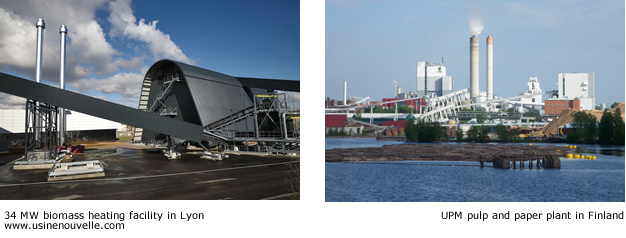WS26: Contribution of sustainable biomass and bioenergy in INDUSTRY TRANSITIONS towards a circular economy
19-20 October 2020 – e-Workshop organized by IEA Bioenergy, in collaboration with ADEME

According to IEA’s Sustainable Development Scenario (SDS), the use of bioenergy in industry will grow substantially, from approximately 8 EJ today to 24 EJ in 2060. This implies that the industrial sector will be the greatest user of bioenergy after the transport sector, replacing fossil sources in both low- and medium-temperature applications (e.g. for hot water production or for drying), as well as for higher-temperature (HT) applications (such as HT steam supply and for direct use in cement kilns and glass furnaces). Moreover, in the transition to a circular economy, which needs to be increasingly based on recycling and renewable resources, chemicals and materials produced from biomass will play a key role in chemical and process industries.
The workshop intended to share examples of strategies and initiatives of biomass use in industries in their transition to a more circular economy, thereby increasingly moving towards recycling and renewable resources. To facilitate remote attendance, the online workshop was split up in three sessions. All sessions had a duration of around 2 hours, of which a substantial part was dedicated to discussion and Q&A, aiming to formulate recommendations to facilitate the deployment of such applications.
Summary Report: IEA-Bioenergy-ExCo86-eWorkshop-Final
AGENDA, RECORDINGS AND PRESENTATIONS
Monday 19 October 2020
14.00 – 16.00 CEST
Intro & Part 1: Biomass for medium and high temperature heat in industry
This first session of the workshop started with introductory presentations of ADEME and IEA on the role of biomass in industry, and then went into a number of cases and strategies to use biomass for medium to high temperature heat (e.g. steam supply) in industry. The focus in this session was on opportunities to defossilize low- of medium scale industries, such as food industries.
Moderators:
Jim Spaeth, US DoE (United States); Mark Brown, University of Sunshine Coast (Australia)
Speakers:
David Marchal, ADEME (France): The French biomass policy framework
Paolo Frankl, IEA – International Energy Agency: The role of biomass in industry in IEA SDS scenarios
Olle Olsson, SEI – Stockholm Environmental Institute (Sweden): Addressing barriers to high temperature biomass heat in industry: policy & market issues
Jaap Koppejan, Pro Biomass (Netherlands): Case studies of biomass providing medium to high temperature heat in industry
Minh-Hiep Nguyen, Nestlé (France): General strategies to include biomass heat in food industries
Richard O’Shea / Jerry D. Murphy, SFI MaREI Centre for Energy, Climate and Marine (Ireland): Decarbonisation of whiskey production using circular economy bioenergy system
Moderated Q&A
Tuesday 20 October 2020
10:00 – 12:00 CEST
Part 2: Biomass in energy intensive industries – steel & cement sectors
This session considered the opportunities of biomass in larger, energy intensive industries. Examples are energy provision in cement industries, or provision of sustainable carbon sources in steel industries. There are also options to capture CO2 in these industries and convert them into fuel or products.
Moderators:
Daniela Thrän, DBFZ/UFZ (Germany); Paul Bennett, SCION (New Zealand)
Speakers:
Juha Hakala, VTT (Finland): Prospects for the use of biomass in the steel industry
Samane Maroufi, University of New South Wales (Australia): Alternative sustainable carbon sources as substitutes for metallurgical coal
Wim Van Der Stricht, Arcelor Mittal (Belgium): Turning carbon emissions from blast furnace gas into bioethanol at ArcelorMittal Gent
Elliot Mari, ADEME (France): The role of biomass in decarbonization of cement industries
Vesa Helanti, VALMET (Finland): Biomass gasification for industrial kilns
Dou Kejun, CNREC – China National Renewable Energy Center (China): Biomass in Chinese industry
Moderated Q&A
Tuesday 20 October 2020
14:00 – 16:00 CEST
Part 3: Biomass in chemical/process industries
In the transition to a circular economy, which needs to be increasingly based on recycling and renewable resources, chemicals and materials produced from biomass will play a key role in chemical and process industries. This session highlighted some cases and strategies to reduce reliance on fossil resources in chemical industries and move to biobased products/chemicals.
Moderators:
Kees Kwant, RVO.nl (Netherlands); Ed de Jong, Avantium (Netherlands)
Speakers:
Stéphane Ledoux, AllEnvi (France): Transitioning to biobased in the chemical industry
Cas König, Chemport Europe (Netherlands): Green Hydrogen Hub of Europe – Northern Netherlands ten years ahead of the Paris Agreement
Michael Duetsch, UPM (Germany): Pulp & paper industries moving to biobased chemicals
Amit Goyal, Southern Research (USA): Renewable Acrylonitrile for Carbon Fiber Production
Nelo Emerencia, Biobased Industries Consortium (Belgium): Moving forward in biobased industries
Moderated Q&A
Luc Pelkmans, IEA Bioenergy: Summary and conclusions of the workshop


